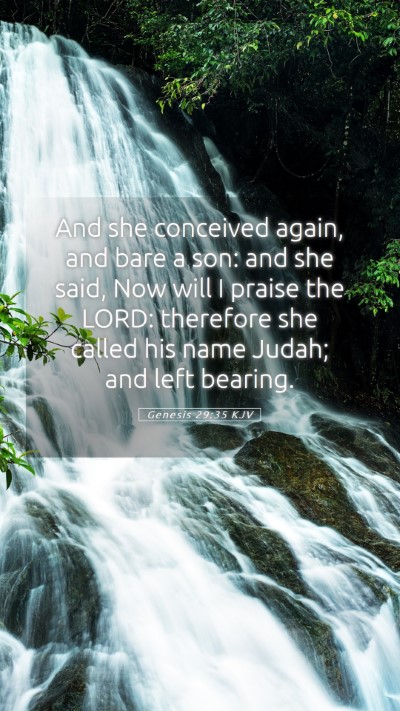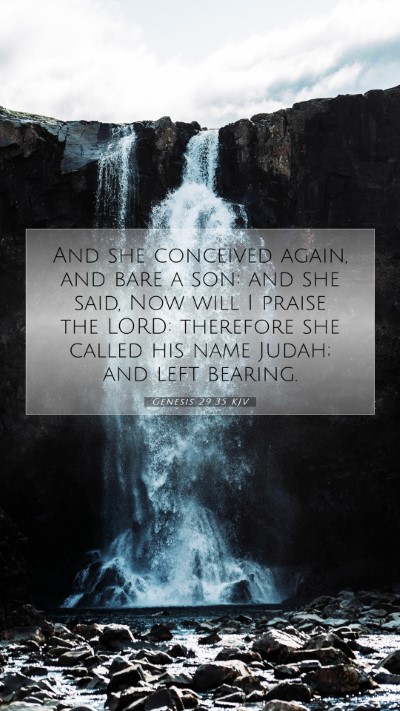Understanding Genesis 29:35
Genesis 29:35 reads: "And she conceived again, and bare a son: and she said, Now will I praise the LORD: therefore she called his name Judah; and left bearing." This verse marks a significant moment in the life of Leah, the wife of Jacob, revealing both personal and theological insights.
Bible Verse Meanings and Interpretations
The verse encapsulates Leah's journey through struggle and her eventual recognition of God's role in her life. Public domain commentaries shed light on various aspects of this verse, enhancing our understanding of its deeper meanings.
Insights from Matthew Henry
Matthew Henry notes that Leah's experience reflects the profound emotional struggles faced by women in her position. Her naming of Judah, meaning "praised" or "thanksgiving," signifies a shift in her perspective. After bearing three sons, she identifies the need to praise God actively instead of desiring Jacob's love. This marks a pivotal moment of spiritual awakening for Leah, one where she acknowledges God’s providence and blessing despite her circumstances.
Insights from Albert Barnes
Albert Barnes emphasizes that Leah's naming of Judah not only denotes her gratitude but also prefigures the importance of this tribe in biblical history. Judah eventually becomes the leading tribe in Israel, through which David and ultimately Jesus Christ will come. This prophetic meaning underscores the significance of Leah's seemingly personal victory in faith, transforming into a crucial part of the bigger narrative of God's plan for redemption.
Insights from Adam Clarke
Adam Clarke elaborates on the theological implications of Judah's name. He suggests that Leah's shift toward praise indicates the ultimate aspiration of God's people—to offer thanks despite trials. Her declaration of praise symbolizes the proper response to divine blessings, prompting readers to reflect on their own expressions of gratitude to God in their daily lives. Clarke points out that Leah begins to understand her identity not through her relationship with Jacob but through her relationship with God, paving the way for collective worship in Israel.
Historical Context and Significance
This verse not only illustrates Leah's personal journey but also serves as a microcosm of Israel's history. The dynamics between Leah and Rachel, Jacob’s wives, exemplify the struggles for affection and recognition that permeate human relationships. Leah's praise upon the birth of Judah indicates a reorientation towards gratitude that is vital for spiritual growth and community identity.
Challenges in Leah's Life
- Her rivalry with her sister Rachel, who bore Jacob’s affection.
- Feelings of rejection and low self-worth, stemming from her relationship with Jacob.
- The societal expectations of women during her time, heavily linked to childbearing.
Transformation Through Praise
Leah's declaration of praise upon naming Judah showcases an essential theme in the Bible: recognizing God’s sovereignty. Her recognition highlights a transition from despair to praise, illuminating how spiritual realities inform personal circumstances. Leah’s journey becomes a source of encouragement, signifying that worship can provoke profound change and evolve from a place of hardship.
Applications for Today
For modern believers, Genesis 29:35 offers rich insights on the nature of gratitude. It reminds us that even amid struggles, turning toward praise can bring forth spiritual clarity and renewal.
Practical Takeaways:
- Embrace a posture of gratitude in daily life.
- Seek a relationship with God that transcends societal definitions of success.
- Recognize and appreciate the blessings that come, however small they may seem.
Conclusion
Genesis 29:35 serves as a pivotal verse in Scripture, both historically and theologically. Through her journey, Leah teaches us about the importance of valid expressions of faith, gratitude, and recognition of God's presence in our lives. As we explore this verse, we are reminded that through our own struggles, we can find opportunities for praise and transformation.
Related Bible Cross References
- Genesis 30:9-13: Explores further dynamics in Leah and Rachel's family.
- Psalms 105:23-24: Reflects on God’s faithfulness to the lineage of Judah.
- Romans 8:28: Affirms God’s ability to work all things for good in believers' lives.


